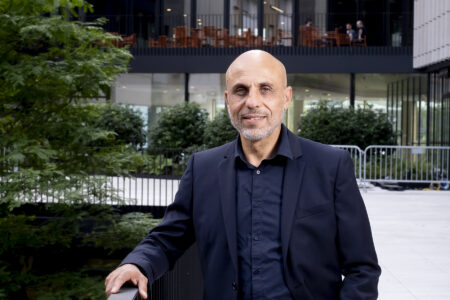In the next few years, quantum computing is expected to revolutionise the use of data, outperforming even the most powerful classical computers. It will also challenge the traditional cryptographic techniques used to ensure cybersecurity. “It is still difficult to imagine all the consequences of combining artificial intelligence and quantum computing, but we will probably have some surprises,” says Mohamed Ourdane, who heads the cybersecurity department at POST Luxembourg. “It’s very important for us to be prepared, not only in terms of technologies but also in terms of skills.”
It’s very important for us to be prepared, not only in terms of technologies but also in terms of skills.
POST plays a key role in Luxembourg’s data economy as the main telecommunications infrastructure and ICT service provider. The company has extensive experience of developing cybersecurity solutions for securing its own networks as well as for clients in Luxembourg and abroad. To take this activity to the next level, the company decided in 2022 to join a project aimed at developing a next-generation cybersecurity solution, based on quantum key distribution (QKD).
Secure terrestrial and space links
 The use of quantum keys makes it possible to verify the integrity of digital communications. However, it requires specifically dedicated fibre lines and hybrid satellite-terrestrial networks for long-distance communications (secure nodes). Mr Ourdane explains that the first step of the project is to put a terrestrial network in place. “We have deployed a link between Windhof in Luxembourg and Redu in Belgium, complete with QKD boxes that generate the keys used to protect the transport layer and for encryption schemes. The boxes are sourced from the South Korea-owned company ID Quantique, but the system architecture can work with appliances from other providers as well using a specific key management system.”
The use of quantum keys makes it possible to verify the integrity of digital communications. However, it requires specifically dedicated fibre lines and hybrid satellite-terrestrial networks for long-distance communications (secure nodes). Mr Ourdane explains that the first step of the project is to put a terrestrial network in place. “We have deployed a link between Windhof in Luxembourg and Redu in Belgium, complete with QKD boxes that generate the keys used to protect the transport layer and for encryption schemes. The boxes are sourced from the South Korea-owned company ID Quantique, but the system architecture can work with appliances from other providers as well using a specific key management system.”
We will demonstrate that we are able to build a secure system for exchanging quantum-generated keys, extended to Asia via satellite.
The second phase is to extend the key exchange network to Singapore by building a secure node in space. “We will demonstrate that we are able to build a secure system for exchanging quantum-generated keys, extended to Asia via satellite,” Mr Ourdane comments.
The European Space Agency-funded project is managed by Starion Luxembourg, a provider of system engineering for space, defence and critical infrastructure. Researchers from the University of Luxembourg’s Interdisciplinary Centre for Security, Reliability and Trust (SnT) are developing the secure appliance that will use the quantum keys, while POST Luxembourg sets up the overall architecture and deploys the terrestrial links. HITEC Luxembourg will oversee the setup of the optical ground station that will be implemented on the roof of the Windhof datacentre. The consortium also includes Canadian quantum-safe cybersecurity pioneer evolutionQ, in charge of providing the key management system, and SpeQtral, a Singapore-based company dealing with space-based transmission to create a quantum key distribution communication network using the satellite link.
Strategic preparations for the future
For Mr Ourdane, the QKD project is of strategic importance not only for Luxembourg, but for Europe as well. “As a central ICT hub in the EU and beyond, it is important for Luxembourg to be a frontliner in the data economy. Implementing quantum computing and security is a logical continuation of the strategy that previously resulted in the business-oriented supercomputer MeluXina, for example. For Europe, it is important to develop technical sovereignty as much as possible, not least in the field of cybersecurity.”
He also underlines how crucial the project is for POST. “In today’s digital society, a whole country can get stuck if telecommunications fail. As a key infrastructure provider, we have to be prepared to deal with any future threat that may appear.”
As a central ICT hub in the EU and beyond, it is important for Luxembourg to be a frontliner in the data economy.
According to Mr Ourdane, innovation should be at the heart of the strategy of all businesses. “Even traditional and public or state-owned enterprises must innovate and dare to venture into new areas outside their traditional services. A high-profile project like this one is also an excellent way to attract and retain talent – a key success factor for the future,” he concludes.
Photo credits: Luxinnovation/Jessica Theis
